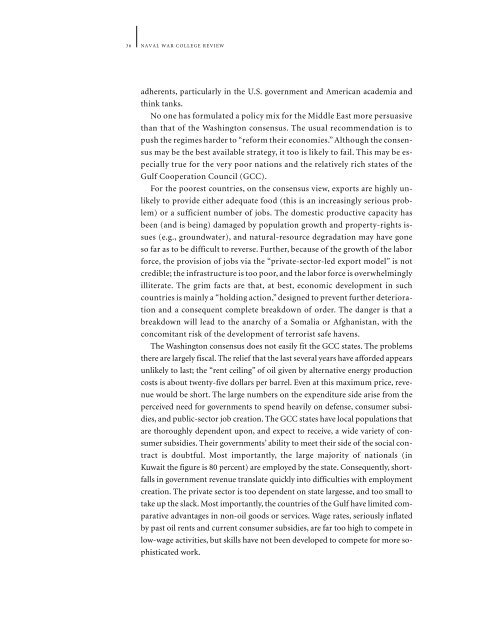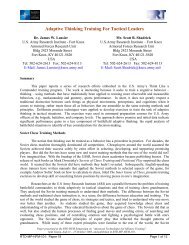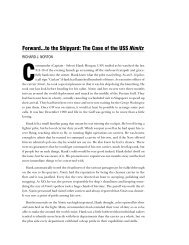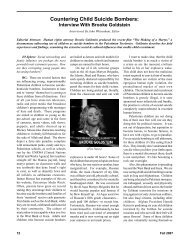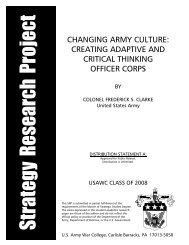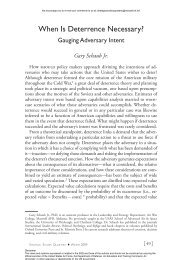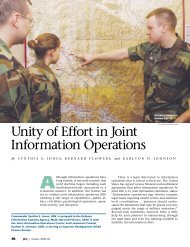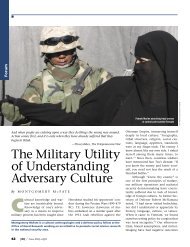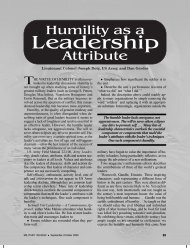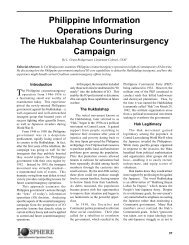Socioeconomic Roots of Middle East Radicalism
Socioeconomic Roots of Middle East Radicalism
Socioeconomic Roots of Middle East Radicalism
You also want an ePaper? Increase the reach of your titles
YUMPU automatically turns print PDFs into web optimized ePapers that Google loves.
36 NAVAL WAR COLLEGE REVIEW<br />
adherents, particularly in the U.S. government and American academia and<br />
think tanks.<br />
No one has formulated a policy mix for the <strong>Middle</strong> <strong>East</strong> more persuasive<br />
than that <strong>of</strong> the Washington consensus. The usual recommendation is to<br />
push the regimes harder to “reform their economies.”Although the consensus<br />
may be the best available strategy, it too is likely to fail. This may be especially<br />
true for the very poor nations and the relatively rich states <strong>of</strong> the<br />
Gulf Cooperation Council (GCC).<br />
For the poorest countries, on the consensus view, exports are highly unlikely<br />
to provide either adequate food (this is an increasingly serious problem)<br />
or a sufficient number <strong>of</strong> jobs. The domestic productive capacity has<br />
been (and is being) damaged by population growth and property-rights issues<br />
(e.g., groundwater), and natural-resource degradation may have gone<br />
so far as to be difficult to reverse. Further, because <strong>of</strong> the growth <strong>of</strong> the labor<br />
force, the provision <strong>of</strong> jobs via the “private-sector-led export model” is not<br />
credible; the infrastructure is too poor, and the labor force is overwhelmingly<br />
illiterate. The grim facts are that, at best, economic development in such<br />
countries is mainly a “holding action,”designed to prevent further deterioration<br />
and a consequent complete breakdown <strong>of</strong> order. The danger is that a<br />
breakdown will lead to the anarchy <strong>of</strong> a Somalia or Afghanistan, with the<br />
concomitant risk <strong>of</strong> the development <strong>of</strong> terrorist safe havens.<br />
The Washington consensus does not easily fit the GCC states. The problems<br />
there are largely fiscal. The relief that the last several years have afforded appears<br />
unlikely to last; the “rent ceiling” <strong>of</strong> oil given by alternative energy production<br />
costs is about twenty-five dollars per barrel. Even at this maximum price, revenue<br />
would be short. The large numbers on the expenditure side arise from the<br />
perceived need for governments to spend heavily on defense, consumer subsidies,<br />
and public-sector job creation. The GCC states have local populations that<br />
are thoroughly dependent upon, and expect to receive, a wide variety <strong>of</strong> consumer<br />
subsidies. Their governments’ ability to meet their side <strong>of</strong> the social contract<br />
is doubtful. Most importantly, the large majority <strong>of</strong> nationals (in<br />
Kuwait the figure is 80 percent) are employed by the state. Consequently, shortfalls<br />
in government revenue translate quickly into difficulties with employment<br />
creation. The private sector is too dependent on state largesse, and too small to<br />
take up the slack. Most importantly, the countries <strong>of</strong> the Gulf have limited comparative<br />
advantages in non-oil goods or services. Wage rates, seriously inflated<br />
by past oil rents and current consumer subsidies, are far too high to compete in<br />
low-wage activities, but skills have not been developed to compete for more sophisticated<br />
work.


